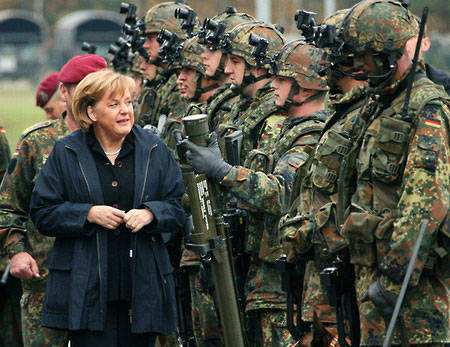欧洲
German Defense: Eine deutsche Atombombe
德国国防:德国的原子弹
Donald Trump has German thinking the unthinkable.
唐纳德特朗普使德国开始考虑一件 “不可思议” 的事。
It began in November, soon after the election of Donald Trump as America's president.
德国想拥有核武器的想法在11月初见端倪,也就是在唐纳德特朗普当选美国总统不久后。
The publisher of the Frankfurter Allgemeine Zeitung, a conservative newspaper, opined in an editorial that it was time to contemplate “the altogether unthinkable for a German brain, the question of a nuclear deterrence capability, which could make up for doubts about American guarantees”.
风格偏于保守的德国《法兰克福汇报》的一篇社论表示:“如果特朗普不为欧洲提供核安全保障,德国是时候考虑一下如何拥有自己的核威慑能力”。

Roderich Kiesewetter, a foreign-policy expert in the Christian Democratic Union, the party of Chancellor Angela Merkel, chimed in that there should be no “thought taboos”.
Angela Merkel总理领导的基督教民主联盟的外交政策专家Roderich Kiesewetter对此赞同,并表示关于核武器不应该存在什么“思想禁忌”。
He and other politicians then went silent, apparently after a signal that the chancellor did not need this distraction in an election year.
但随后由于总理忙于选举,无法分心对此事投入过多精力,Roderich Kiesewetter和其他政客的态度转为沉默。
But in Germany's think-tanks the debate kept raging.
但是,在德国国内的智囊团,他们对此的辩论正在变得越来越激烈。
Since 1945 West Germany and then the reunited country have relied on the American nuclear shield to deter aggression from Russia.
自从1945年的西德和之后的统一的德国都依靠美国的核庇护来阻止俄罗斯的侵略。
A prominent thesis, outlined in 1984 by Josef Joffe, a journalist, holds that European integration was only possible because this external American power had “pacified” the age-old Franco-German conflicts.
记者Josef Joffe在1984年的一篇文章中概述道,美国的势力使得法德之间长久以来的冲突得以平息,这使得欧洲一体化成为现实。
So West Germany, on its best behaviour after the war, signed the non-proliferation treaty in the 1960s; it reaffirmed the pledge in the treaty that led to reunification in 1990.
二战后由于西德的良好表现,即在1960年签署了《核不扩散条约》,西德重申了条约里的承诺,这些承诺促使德国在1990年实现统一。



